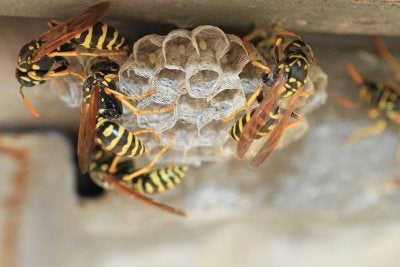They might not be as frightening as lions, tigers, and bears, but winged stinging insects have their own reasons to be feared. For starters, getting stung by a yellow jacket, bee, or wasp hurtsâ a lot . If that wasnât a good enough reason to avoid these stinging flying insects, there have also been numerous reports over the years of people actually dying from yellow jacket, bee, and wasp attacks. With all the extra time youâll be spending outside over the next couple of months, we put together this brief guide to help you battle these common stinging insects. If your home or business is overrun with yellow jackets, bees, or wasps, contact a pest control provider in Dublin. If the insects begin to swarm, stay indoors until the exterminator arrives.

Distinguishing Between the Different Stinging Flyers
Southern Californian yellow jackets are easy to identify by their distinguishing black and yellow markings. Paper wasps are often mistaken for yellow jackets but are in fact much longer in the body and have a much thinner waist compared to their more aggressive cousins. Although honeybees have similar coloration, they are actually mustard yellow and brown. Honeybees are also much thicker and stockier than yellow jackets. Your pest control provider can identify the threat before making your home or business safe.
Getting stung is never fun, and in some cases can be life-threatening. One of the best things you can do to avoid getting stung by yellow jackets, bees, wasps, or other summer flyers is to gently brush them away instead of swatting at them. When attacked and distressed, many flying insects will release a pheromone in the air that signals the colony itâs time to attack. Also try to avoid floral perfumes, lotions, and hair products when going out to avoid being a major point of interest for yellow jackets, bees, and wasps.
What to Do If You Get Stung
Although getting stung never feels good, most instances donât require medical help. However, you should seek immediate medical care if you or a loved one:
- Has been stung more than 10 times
- Has been stung in the mouth or throat
- Has difficulty breathing or speaking, swelling in the mouth or throat, or tightness in the chest following a yellow jacket, bee, or wasp sting

